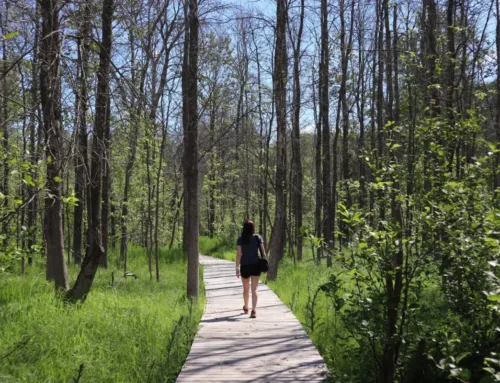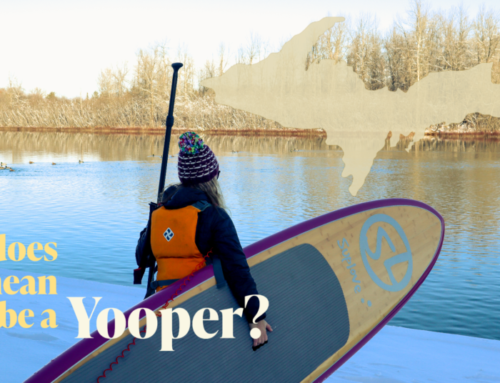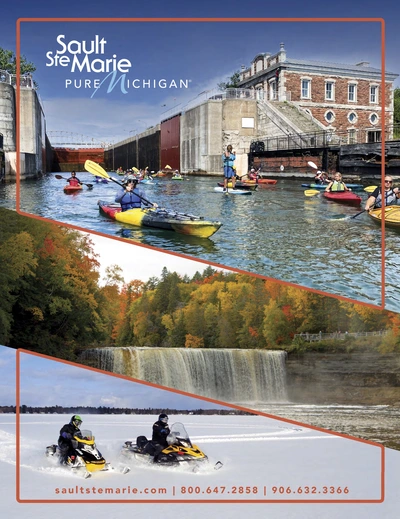The fields, forest, and water around Sault Ste. Marie attracts a wide variety of winter specialties that can’t be found any further south. This makes Sault Ste. Marie is not only the premier winter birding destination in all of Michigan but the best American winter birding place east of the Mississippi. Read on to learn about the best ways to go winter birding in Sault Ste Marie, Michigan.

Open Fields
Of all the winter birds that can be seen in the Eastern Upper Peninsula during winter, the Snowy Owl is arguably the most majestic and sought after. And nowhere else in Michigan can you reliably see Snowy Owls year after year like you can in the open fields of Soo Township, Rudyard, and Pickford. In particular, the fields along Centerline and Hantz Roads between M-48 and 19 Mile Road in Rudyard consistently house anywhere from two-20+ Snowy Owls each winter. M129 and 22 Mile Rd, as well as Hancock and Centerline Roads in Pickford, are additional great places to catch a glimpse of this snowy visitor from the North. While out in the fields make sure to keep an eye out for a number of other raptor species such as Rough-Legged Hawks and Bald Eagles.

Another regular species of these open fields is the Sharp-tailed Grouse, a chicken-like bird that can be seen feeding on apples or buds of poplar and aspen trees. In some years, known as irruption years, raptors from the northern forests of Canada will show up in sizable numbers. Great Gray Owls, Northern Hawk Owls and occasionally Gyrfalcons have been known to show up across the area. You never know what you’ll find as you scan the fields!

Feeders
Winter Finch and waxwing species appear in sizable numbers from November through March. The spectacular Pine Grosbeak is a yearly visitor to the region as is Bohemian Waxwing, Common and Hoary Redpoll, Purple Finch, and Evening Grosbeak. There are a variety of places where you can find these birds in the area, but the best locations are wherever there are bird feeders or fruit trees such as crab-apple.

Right in downtown Sault Ste. Marie there are a number of birds to be found, including at the fruit trees on the campus of Lake Superior State University. Just south of town at the Dafter Post Office is another great place to view these birds. One of the most popular location in the whole area for feeder watching is Dunbar Park. Here there are both fruit trees and a large number of bird feeders that are regularly filled. Rarities like Boreal Owl and Townsend Solitaire have also shown up here in past years. The small village of Pickford is another location to check local feeders before you head out into the fields for Snowy Owls.

Hulbert and Tahquamenon
While a bit off the beaten path, the small hamlet of Hulbert is one of the better locations for Gray Jays in the EUP. These charismatic birds are quite tame and known to approach humans in search of a handout.

Bring some birdseed and chances are they may eat right out of your hand. The area along Basnau Road between M-28 is a particularly vibrant location for this species and occasionally house both Red and White-winged Crossbill. Tahquamenon Falls State Park is another enjoyable winter location. M-123 between Paradise and the Upper Falls portion of the park is a great location for Spruce Grouse and Red Crossbills. Many of the side roads in this area can be driven or snowshoed in search of these species. The waterfalls themselves are spectacular in the winter as well as large ice formations contour all around them.

It’s true that most of the birds head south for the winter in this area, but what remains is a spectacular combination of rare northern birds that can’t be seen in the country any other time of year. There are plenty of birds to see and activities to be had in Sault Ste. Marie during the winter months. Keep exploring our website to plan your next getaway. Check out this Eastern Upper Peninsula Winter birding map for a full list of trial ways to go birding.
Do you have a favorite place to see birds? Tag us in your birding photos of with #ilovethesoo so we can share in the fun! Be sure to follow us on Facebook, Twitter, Pinterest, and Instagram.
Written by Elliot Nelson Sea Grant Extension Educator, Eastern Upper Peninsula at Lake Superior State University






